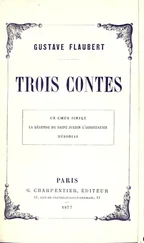Madame Aubain's grief was uncontrollable. At first she rebelled against God, thinking that he was unjust to have taken away her child—she who had never done anything wrong, and whose conscience was so pure! But no! she ought to have taken her South. Other doctors would have saved her. She accused herself, prayed to be able to join her child, and cried in the midst of her dreams. Of the latter, one more especially haunted her. Her husband, dressed like a sailor, had come back from a long voyage, and with tears in his eyes told her that he had received the order to take Virginia away. Then they both consulted about a hiding–place.
Once she came in from the garden, all upset. A moment before (and she showed the place), the father and daughter had appeared to her, one after the other; they did nothing but look at her.
During several months she remained inert in her room. Felicite scolded her gently; she must keep up for her son and also for the other one, for "her memory."
"Her memory!" replied Madame Aubain, as if she were just awakening, "Oh! yes, yes, you do not forget her!" This was an allusion to the cemetery where she had been expressly forbidden to go.
But Felicite went there every day. At four o'clock exactly, she would go through the town, climb the hill, open the gate and arrive at Virginia's tomb. It was a small column of pink marble with a flat stone at its base, and it was surrounded by a little plot enclosed by chains. The flower–beds were bright with blossoms. Felicite watered their leaves, renewed the gravel, and knelt on the ground in order to till the earth properly. When Madame Aubain was able to visit the cemetery she felt very much relieved and consoled.
Years passed, all alike and marked by no other events than the return of the great church holidays: Easter, Assumption, All Saints' Day. Household happenings constituted the only data to which in later years they often referred. Thus, in 1825, workmen painted the vestibule; in 1827, a portion of the roof almost killed a man by falling into the yard. In the summer of 1828, it was Madame's turn to offer the hallowed bread; at that time, Bourais disappeared mysteriously; and the old acquaintances, Guyot, Liebard, Madame Lechaptois, Robelin, old Gremanville, paralysed since a long time, passed away one by one. One night, the driver of the mail in Pont–l'Eveque announced the Revolution of July. A few days afterward a new sub–prefect was nominated, the Baron de Larsonniere, ex–consul in America, who, besides his wife, had his sister–in–law and her three grown daughters with him. They were often seen on their lawn, dressed in loose blouses, and they had a parrot and a negro servant. Madame Aubain received a call, which she returned promptly. As soon as she caught sight of them, Felicite would run and notify her mistress. But only one thing was capable of arousing her: a letter from her son.
He could not follow any profession as he was absorbed in drinking. His mother paid his debts and he made fresh ones; and the sighs that she heaved while she knitted at the window reached the ears of Felicite who was spinning in the kitchen.
They walked in the garden together, always speaking of Virginia, and asking each other if such and such a thing would have pleased her, and what she would probably have said on this or that occasion.
All her little belongings were put away in a closet of the room which held the two little beds. But Madame Aubain looked them over as little as possible. One summer day, however, she resigned herself to the task and when she opened the closet the moths flew out.
Virginia's frocks were hung under a shelf where there were three dolls, some hoops, a doll–house, and a basic which she had used. Felicite and Madame Aubain also took out the skirts, the handkerchiefs, and the stockings and spread them on the beds, before putting them away again. The sun fell on the piteous things, disclosing their spots and the creases formed by the motions of the body. The atmosphere was warm and blue, and a blackbird trilled in the garden; everything seemed to live in happiness. They found a little hat of soft brown plush, but it was entirely moth–eaten. Felicite asked for it. Their eyes met and filled with tears; at last the mistress opened her arms and the servant threw herself against her breast and they hugged each other and giving vent to their grief in a kiss which equalised them for a moment.
It was the first time that this had ever happened, for Madame Aubain was not of an expansive nature. Felicite was as grateful for it as if it had been some favour, and thenceforth loved her with animal–like devotion and a religious veneration.
Her kind–heartedness developed. When she heard the drums of a marching regiment passing through the street, she would stand in the doorway with a jug of cider and give the soldiers a drink. She nursed cholera victims. She protected Polish refugees, and one of them even declared that he wished to marry her. But they quarrelled, for one morning when she returned from the Angelus she found him in the kitchen coolly eating a dish which he had prepared for himself during her absence.
After the Polish refugees, came Colmiche, an old man who was credited with having committed frightful misdeeds in '93. He lived near the river in the ruins of a pig–sty. The urchins peeped at him through the cracks in the walls and threw stones that fell on his miserable bed, where he lay gasping with catarrh, with long hair, inflamed eyelids, and a tumour as big as his head on one arm.
She got him some linen, tried to clean his hovel and dreamed of installing him in the bake–house without his being in Madame's way. When the cancer broke, she dressed it every day; sometimes she brought him some cake and placed him in the sun on a bundle of hay; and the poor old creature, trembling and drooling, would thank her in his broken voice, and put out his hands whenever she left him. Finally he died; and she had a mass said for the repose of his soul.
That day a great joy came to her: at dinner–time, Madame de Larsonniere's servant called with the parrot, the cage, and the perch and chain and lock. A note from the baroness told Madame Aubain that as her husband had been promoted to a prefecture, they were leaving that night, and she begged her to accept the bird as a remembrance and a token of her esteem.
Since a long time the parrot had been on Felicite's mind, because he came from America, which reminded her of Victor, and she had approached the negro on the subject.
Once even, she had said:
"How glad Madame would be to have him!"
The man had repeated this remark to his mistress who, not being able to keep the bird, took this means of getting rid of it.
He was called Loulou. His body was green, his head blue, the tips of his wings were pink and his breast was golden.
But he had the tiresome tricks of biting his perch, pulling his feathers out, scattering refuse and spilling the water of his bath. Madame Aubain grew tired of him and gave him to Felicite for good.
She undertook his education, and soon he was able to repeat: "Pretty boy! Your servant, sir! I salute you, Marie!" His perch was placed near the door and several persons were astonished that he did not answer to the name of "Jacquot," for every parrot is called Jacquot. They called him a goose and a log, and these taunts were like so many dagger thrusts to Felicite. Strange stubbornness of the bird which would not talk when people watched him!
Nevertheless, he sought society; for on Sunday, when the ladies Rochefeuille, Monsieur de Houppeville and the new habitues, Onfroy, the chemist, Monsieur Varin and Captain Mathieu, dropped in for their game of cards, he struck the window–panes with his wings and made such a racket that it was impossible to talk.
Читать дальше








![Гюстав Флобер - Закат Карфагена [Сборник]](/books/414440/gyustav-flober-zakat-karfagena-sbornik-thumb.webp)

